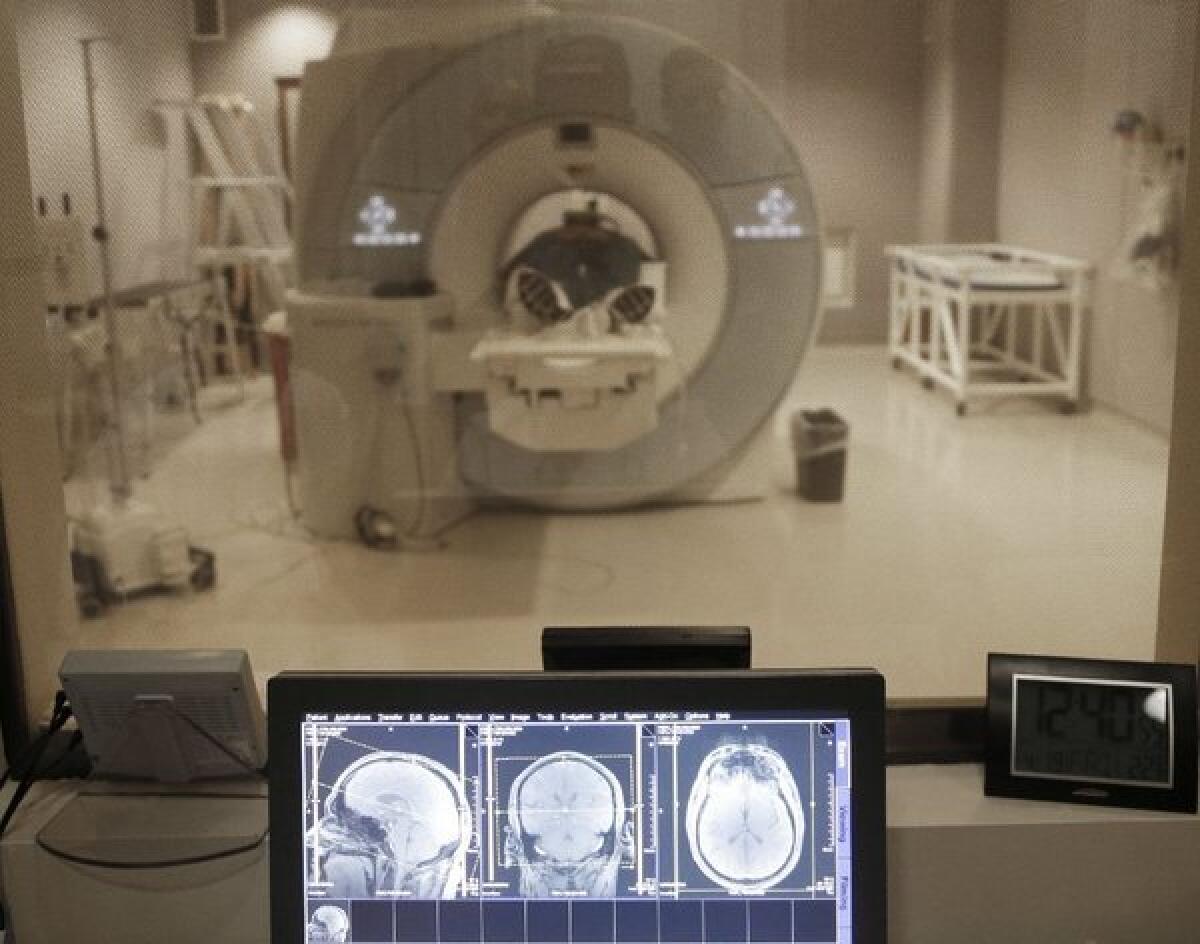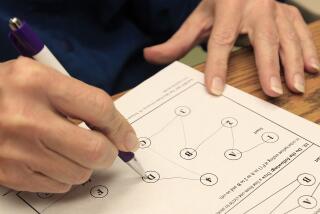NFL players’ brains at work show early signs of concussions’ toll

- Share via
Watching the brains of former football players at work on a demanding mental task, researchers believe they have identified an early warning sign of concussions’ cumulative toll, and the cognitive trouble it may portend.
The study found only modest differences between the performance of 13 retired National Football League football players and 60 healthy comparison subjects on a standardized test of attention, planning and mental agility. But in a brain scanner, researchers report they detected dramatic differences in how the two groups’ brains activated while performing that task.
And the longer the former football player’s history of suspected concussions, the more dramatic was the difference between his brain’s pattern of activation during the test and that routinely seen among the 60 healthy members of the study’s control group.
The latest research adds to mounting evidence that while the immediate symptoms of a blow to the head may appear temporary, the effects of concussion are cumulative, and can result in changes in brain function with long-term cognitive and psychological consequences. It was published Thursday in the journal Nature Scientific Reports.
It also may give physicians and patients who have suffered blows to the head a new way to recognize when it’s time to retire from activity that may worsen future cognitive function, and get early help for the damage done. Feeding their findings into pattern-recognition computer software, the authors have isolated the distinctive patterns of brain activation that could predict trouble ahead.
The NFL players who participated in the study were considered cognitively healthy: none had been diagnosed with disorders that have been linked in recent years to repeated head trauma, including depression, mild cognitive impairment, dementia or Parkinson’s disease. But all reported to researchers they felt some mental slippage.
Signs of the players’ perceived mental slippage were barely evident in their performance on a test known as the “stockings of Cambridge.” The task is a computer variant of the better-known “Towers of Hanoi,” in which a test subject is asked to reorganize stacks of colored balls to replicate a pattern provided, and do so fast, repeatedly, and at escalating difficulty. Performing well requires planning skills, sustained attention and good working memory, making the test a fair measure of a person’s ability to navigate the complexities of daily life.
Compared to the 60 healthy college graduates recruited from the San Diego area, the former football players completed the “stockings of Cambridge” task, on average, just a bit more slowly and accurately. That was not a surprising finding, because such players have, in past studies, fared slightly more poorly in such tests of “executive function” than their peers in the general population. And a player’s skill in performing the task was not related to how many times he had been dispatched from the field with a suspected concussion, researchers found.
But when the subjects were asked to complete the stockings of Cambridge while in a brain scanner, differences between the NFL players and the control group became starkly evident. Researchers noted that, while performing the task, the brains of NFL players showed dramatically higher activity in the dorsolateral prefrontal cortex -- a region key to planning and executive function -- than was seen in the same brain areas of the control group. When the task was at its most demanding, the former football players tended to recruit additional brainpower from nearby brain regions to help complete the task. The healthy control subjects, meanwhile, completed the task without such extra brain activation.
As the former NFL players worked to complete the test, the researchers also detected a notably low volume of message traffic among regions of the brain that must coordinate in order to divide one’s attention among competing priorities, to make sense of a barrage of incoming sensory information, and to plan and execute movement. Among healthy control subjects, the connectivity of those regions was much higher than it was among the former NFL players.
Collectively, the differences in brain function between the former NFL players and their healthy comparison group suggest that long before concussion-related dementia is evident, the brain begins to work differently to keep up. As crucial brain networks break down, those who have sustained cumulative injuries to their brain must exert extra mental energy just to deliver cognitive performance approaching normal.
And the more injured the brain, the less efficient it is in its efforts to compensate.
It’s a strategy seen in other populations as well. University of Vermont neuroscientist Julie Dumas and collaborators found in a recent study that middle-aged women who suspected they were suffering mental slippage -- “cognitive complainers,” she called them -- performed as well on standardized tests of short-term (or working) memory as women of similar age who had no cognitive complaints.
But in a brain scan, the cognitive complainers’ compensatory strategy was quite clear to see: to complete the tasks as well as their peers, they had to exert more brainpower. A cognitive complainers’ dorsolateral prefrontal cortex and her anterior cingulate cortex showed, on average, more activity than those of women who did not suspect their cognitive function had declined.
The ability to work the brain harder to compensate for cognitive loss -- a phenomenon known to researchers as cognitive reserve -- “might be at play here with the NFL alumni,” said Dumas, who was not involved in the study of retired NFL players. But the players’ performance appeared to worsen as the task grew more complex, Dumas noted: that underscores that eventually, cognitive reserve is likely to be overwhelmed by worsening disease or dysfunction.
The authors of the latest paper -- researchers from Western Ontario University and Imperial College in London -- suggest the consistent changes in brain function they observed among the serially concussed might be used as an early-warning system: long before their cognitive troubles become disabling, athletes and others at risk for concussion might be tested for these discernible changes and look for safer lines of work. And for retiring athletes with a long history of concussion, evidence of such early changes could be used to make the case for compensation and early medical intervention, the authors wrote.
ALSO:
Einstein’s brain a wonder of connectedness
For the forgetful in menopause, brain works harder to keep up
Beyond the bullet: Odds say a shot to the head should be fatal







